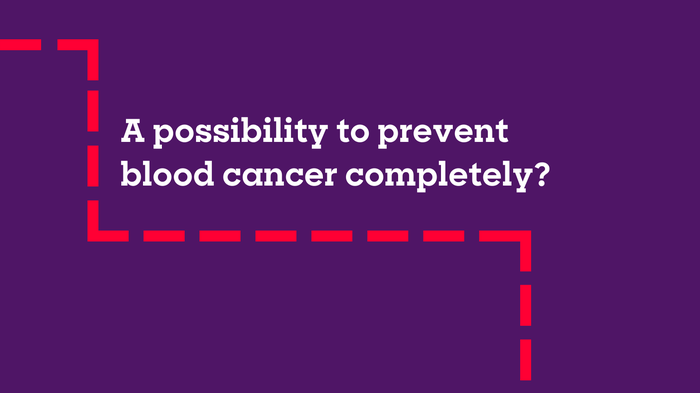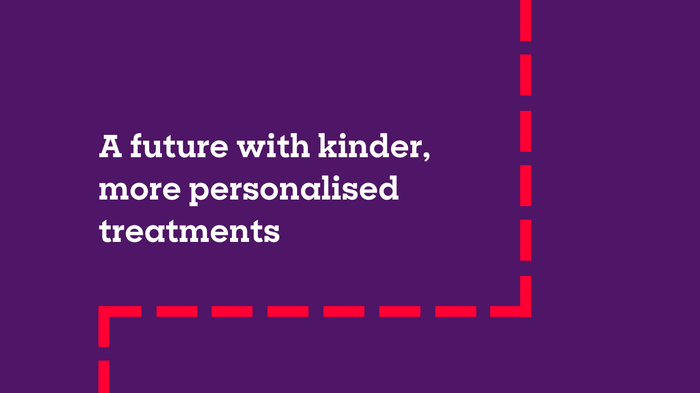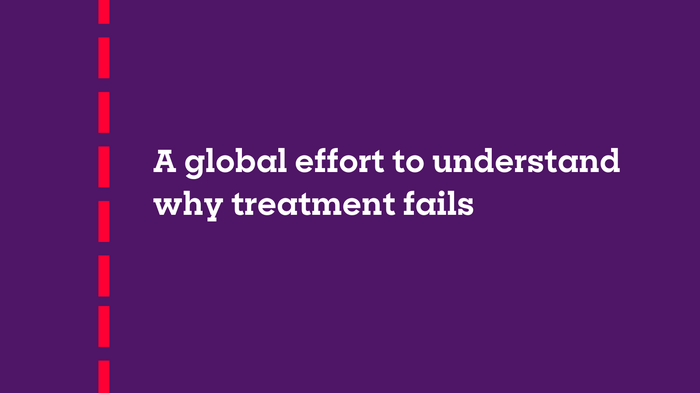The Road to Beating Blood Cancer: Our Final Stop
Over the past weeks, we’ve been hearing from experts across blood cancer about how research has revolutionised things for patients, and what we need to do to get to a day where we can beat the disease. In this blog, our Research Communications Manager, Rachel Kahn, reflects on the conversations she’s had.
Prevention is a real possibility
When I started speaking to researchers for this series, I already had some idea of what they might say when I asked them how we’ll beat the disease. I expected them to talk about creating more personalised treatments, which they did. But there was one common thread that I wasn’t expecting: the possibility of preventing the disease altogether.
We’ve all heard the saying, “prevention is better than cure” but I’ve never seen it as a real possibility. The conversations I had have changed my mind.
Professor Ghulam Mufti, MDS specialist, Professor Claire Harrison, MPN specialist and Professor Brian Huntly, AML specialist, all spoke to me about the potential of being able to prevent blood cancer in the first place.
There’s a wealth of research out there showing that the changes that lead to someone developing blood cancer can exist years, if not decades, before someone starts showing symptoms. If we can identify these changes, there’s potential to intervene early and prevent the disease.
How we intervene isn’t yet understood, but even if intervention isn’t a possibility, at least we could monitor people known to be at risk so we could treat them early and give them the best possible chance of survival and I feel excited at that prospect of this.

A conversation that struck a chord
Professor Irene Ghobrial is without a doubt one of the leading myeloma experts, but something she said about the way we treat myeloma really struck a chord: ‘We wouldn’t turn around to someone with breast cancer and say, “you have no symptoms, let’s wait until your disease spreads and we’ll then treat you”.’
Yet, this is the approach we take for people with myeloma. Those diagnosed with the disease live with it for the rest of their lives, enduring periods of intense treatment which are hopefully followed by remission – but knowing their disease will eventually start to cause them problems again.
But my overwhelming feeling is that it doesn’t need to be like this – and that’s something Irene believed too – we’re treating the disease too late. We know some people are at higher risk of myeloma than others, and we can look for a marker in the blood which tell us someone might develop it. Now we need to find ways to screen for this and treat people earlier, before the disease starts causing significant problems.
I think this will be an area of keen interest over the coming years which could completely change how we treat the disease.
Personalised medicine
This is the topic I thought would come up lots in my conversations with researchers... and it did. If we want to get to a day where we’re saving more lives, we need to stop treating groups of blood cancers the same. We need to look at the specific changes are responsible for someone developing cancer and target these vulnerabilities to treat them.
But there’s more to it than that.
Professor Irene Roberts talked to me about creating a “genetic fingerprint” for someone that not only describes how to target someone’s cancer appropriately, but also describes how someone will react to treatment. She used the example of two people catching the same cold: one might have mild symptoms and the other may feel unwell. This is due to the genes they inherit.
In the same way, people may respond to treatment differently to one another and we need to understand this, as well as how to specifically target cancer cells to truly personalise medicine. Doing both things will bring a future of fewer side effects and move lives saved.

We owe a lot to people who took part in clinical trials
In almost every conversation I had, I was told how stark the difference in treatment was today compared with when these researchers first started treating or studying blood cancer, and none of that could have been possible without clinical trials.
It’s something I’ve reflected on a lot, because for any new treatment to be licensed, a clinical trial would have needed to happen and several altruistic people will have needed to enrol to receive a treatment, not knowing whether it would work or not. It’s thanks to these people that we have the treatments we do today, and we owe them a lot.
There is a difficult balance to strike with treatment
For the blood cancers that are currently incurable, like myeloma and CML, I learnt that there’s a difficult balance to strike in relation to treatment, and there are some urgent things we need to find out.
Professor Irene Ghobrial explained that everyone with myeloma who has had a stem cell transplant is given maintenance treatment to try to keep them in remission, but some of these people don’t need this maintenance treatment and it’s likely they wouldn’t relapse if they were taken off it.
There’s one problem: we don’t know who these people are. I feel like this is an urgent area to explore. Long-term treatment undoubtedly impacts quality of life and if we have the opportunity to take some people off treatment and spare them from this, I think we should absolutely be doing it.
It’s slightly different for people with chronic myeloid leukaemia (CML), with Professor David Vetrie explaining that around 10% of people come off treatment. But this is done without knowing if these people will relapse or not – and some do. I think this is an area that needs to be explored further and could be really beneficial to people in the future.
“Beating” blood cancer means different things to different people
At Blood Cancer UK, we are focused on saving lives and bringing forward the day when no one dies of blood cancer, or their blood cancer treatment. Across the series I asked researchers what they felt “beating” blood cancer meant and the answers I got were all different.
Some felt it was about curing everyone of their blood cancer and getting them off their treatment. Others felt it was about getting to a stage where no one dies of the disease that if we couldn’t cure, people lived with, even if that meant they were on treatment. Even if “beat” does mean different things to different people, we’re all united in trying to ensure we improve things for people with blood cancer, to try and get to a place where no lives are lost from the disease.

Great inequalities exist across the world
When talking about barriers to progress, Professor Ghulam Mufti reminded me about the privilege that exists in the UK. He told me stories of people in developing countries selling their houses to be able to afford treatment for their blood cancer.
It reminded me how lucky we are to have the NHS, and raised an important point: advancements are expensive, and the more advances we make in the UK, the further behind people in developing countries fall.
For me, beating blood cancer doesn’t just mean beating it in this country. It means beating it everywhere, which will take collaboration of scientists and politicians across the world.
The role of Blood Cancer UK – bigger than I realised
Throughout the conversations I had with researchers, I was struck by how often they’d mention breakthroughs that Blood Cancer UK directly contributed to, without even knowing we had.
The minimal residual disease (MRD) test is a prime example of this. Blood Cancer UK funded the research that first allowed this test, which looks for residual cancer cells left behind after treatment, to be developed. Professor Irene Roberts explained how this revolutionised how we treat child leukaemia, but it’s clear that it’s had a ripple effect and has impacted several other cancers too.
Professor Claire Harrison also described the discovery of a mutation called JAK2 that drives many MPNs as ‘monumental’, as it meant treatments could be created that target this, something that research we funded also uncovered. It makes me confident that the charity will bring about immense change in the future and that’s thanks to people like you.

There’s progress to made, and I’m hopeful we’ll make it
I left the conversations I had with these researchers in absolute awe of the people I had spoken to, and the things they have achieved. I’m finishing this series feeling hopeful. We have incredible people carrying out research into the disease in the UK and abroad. These researchers have identified areas where there’s potential to improve things and I’m confident, if we continue to fund research, we will get to a day where we beat blood cancer.
